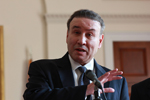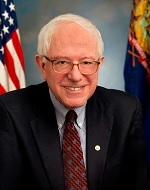For more than a year, the Justice Department (DOJ) has been pursuing a criminal investigation into the possibility of pricing collusion among makers of generics. Three companies have acknowledged receiving subpoenas from the feds, and now a report says the probe may also be looking into whether trade associations were used as a conduit to trade drug-pricing information.
 |
| GPhA CEO Ralph Neas |
According to an intelligence report from Policy and Regulatory Report (PaRR), a source that was given some inside info by a prosecutor involved in the probe said the DOJ is looking closely "at trade associations as part of their investigation as having been one potential avenue for facilitating the collusion between salespeople at different generic producers."
No specific associations were named. The Generic Drug Association (GPhA), the largest trade group for generics producers, had no specific comment on the report, pointing only to an earlier statement by CEO Ralph Neas that the best way to bring down generic drug prices is for the FDA to approve more generics and stimulate competition.
Last fall, Impax Laboratories ($IPXL) reported in financial filing that one of its salespersons had in fact, received a Justice Department subpoena asking for "any communication or correspondence with any competitor" in the sale of generic drugs. At about the same time, Lannett acknowledged that its SVP of sales and marketing was served with a subpoena related to the pricing of any of its drugs.
The most recent disclosure that federal authorities were still hot on the topic was made by generic drugmaker Par Pharmaceutical in February. It reported it had received requests from a number of sources. The DOJ's Antitrust division issued a subpoena for "communications with competitors" about its generic of Covis's Lanoxin, as well as doxycycline products. The company said it also had received a civil demand from the FTC for info about its deal with Concordia Healthcare relating to Par's generic version of Concordia's Kapvay.
Seeking info from sales reps suggests the feds may be looking at some of the most vulnerable links in the chain, hoping for someone to crack and offer up enough information that it can get leverage against companies. A PaRR source says prosecutors see the case much like its antitrust probe of the auto parts industry, which has gone on for years and morphed into the department's largest criminal antitrust probe ever. Like in that case, prosecutors expect "to move from one drug to another in a similar cascading fashion."
 |
| Sen. Bernie Sanders |
There is no question that there is a lot of unhappiness among consumers about how expensive some of their generic meds have gotten and that they have complained loud and long to their members of Congress. One pharmacy benefits manager reported that consumers and insurers paid an average of $13.14 per prescription for the 50 most popular generics in 2010. Four years later, the average was up to $62.10--an increase of 373%. Senator Bernie Sanders is so riled up, he has initiated Senate hearings on drug costs and prompted Health and Human Services take a look at prices as well.
But the threat of criminal charges from DOJ is another matter entirely. With the chance that individuals will prosecuted and with the potential for prison sentences and fines of up to $1 million, federal prosecutors are used to getting the attention, and then the cooperation of companies. But so far, PaRR reports there is not much indication that companies have felt enough heat to step forward and spill an secrets if they have any. It says that only a "handful of companies involved have retained antitrust counsel," and that none have sought amnesty from prosecution.
- find the report here
- here are Neas' comments
Related Articles:
Drug price increases hit record for Q2, with no sign of slowdown, analysts say
Here's an M&A strategy: Buy products, hike prices, watch sales grow
Congress spurs feds to investigate sky-high generic drug prices
Generics makers, execs face potential criminal charges in U.S. pricing probe